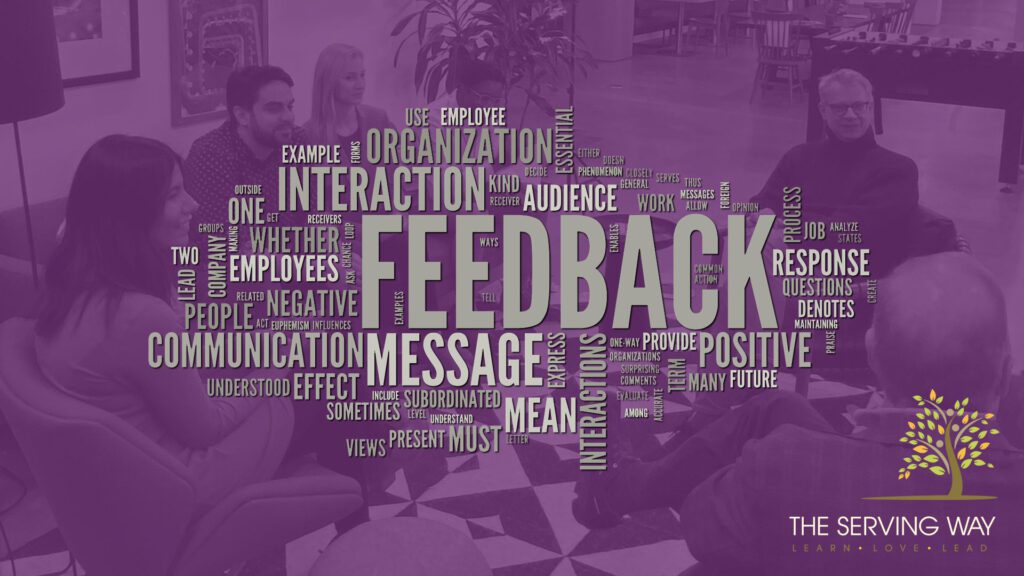We often think that the first thing a leader needs to learn is how to give balanced feedback. But experience shows that a culture of coaching begins when servant-leaders first model how to receive feedback from those they serve.
Servant-leaders know that there is almost always a gap between what they intend and how they are perceived. To close this gap, servant-leaders are open to learning about themselves, and always seeking insights into how they come across to others. Equipped with this knowledge, they increase those actions that others find helpful and freeing. They also welcome suggestions as to what’s getting in the way so they can change these ineffective behaviors.
Here are five practices captured by ThirdRiver Partners*. These practices, when followed consistently, will help you learn from your followers how you are coming across. And by modeling how to receive feedback well, you prepare those you lead to receive your feedback in return. The result: a culture of mutual coaching that builds high alignment with vision, values, and mission, and produces exceptional results.
1. Ask for feedback.
Give others permission to speak into your leadership. If necessary, script how you will invite these conversations. Initially, people may be taken by surprise; they may even be suspicious. That’s why it’s good to have a well-crafted opening, one that sets the expectation that you, as the leader, are genuinely inviting feedback in a healthy way. You are the model; people will align themselves to what you say and do.
When I directed student-instructors at Carnegie Mellon University, I always began the feedback process by asking for their needs, observations, and suggestions. I have to say that this often came as a shock, so conditioned were they to their professors exerting power over and not power with and for them. But I found their feedback consistently helpful, and a great lead-in for me to share my feedback with them.
2. Check your emotional temperature.
Look inside, notice, and assess your knee jerk responses. Are you gearing up to defend and justify rather than actively listen? Or are you asking yourself, “What is this person seeing that I might be missing?” Choose to have a calm, secure, and open mind. Remember, no matter your emotions in the moment, you don’t have to identify who you are with what you feel.
3. Focus on potential benefit.
Assume positive intent, even when your feedback partner is less than gracious. If necessary, reframe what you hear to further your own goals as a leader. Tell yourself, “I can learn from this how to be stronger, more effective, and a servant others will choose to follow and emulate.” Ultimately, that’s your personal aim. Receiving feedback from a posture of appreciation rather than reaction will get you there.
4. Make sure everyone is clear.
Confirm what’s been said by summarizing what you’ve heard. Be objective and positive, and you will keep the path clear for ongoing dialogue. Again, you may need to reframe the feedback. Say it back the way you are receiving it. Replaying the highlights offers the feedback-giver a way to put their thoughts in clearer, more helpful terms. Also you are preparing them for how you will coach them when it’s your turn.
5. Own the feedback and take appropriate action.
Begin by thanking your partner and letting them know as specifically as you can what you plan to start, stop, do more of, and do less of. Be careful here that you don’t promise more than you can deliver. You are truly serving when you take ownership of those changes that are possible and appropriate. And if you have fallen short, as we all do, accept the correction, apologize, turn the page, and move toward healthy growth. You do no one any good to either shirk responsibility or beat yourself up.
Feedback is a gift.
We’ve all learned that it’s better to give than to receive. But when it comes to creating and sustaining a culture of coaching, it’s best to receive first and receive well. That’s how servant-leaders pave the way for others to receive our feedback for their growth and commitment to the great purposes for which our organizations exist.
(Copyright © 2018 The Serving Way — Chris Alan Thyberg.)
*Third River Partners, LLC is a management consultancy that provides leadership and cultural transformation through the actions and practices of serving leadership. www.3rd-river.com




